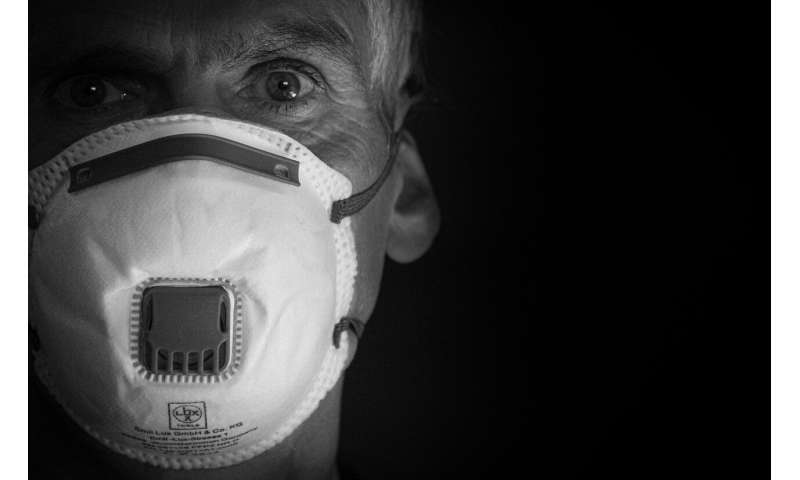
Is it time to wear face coverings when going to the grocery store, pharmacy or medical appointments?
That is the latest advice from Riverside County, Calif., health officials as they try to slow the spread of the coronavirus, which has sickened more than 8,500 people in the state and killed nearly 200.
Federal officials maintain that healthy people do not need to wear masks in most circumstances, but there does seem to be a growing belief that more people should be covering their faces more often.
Here is what we know:
Q. Why is Riverside recommending this?
A. Officials released the new mask guidance Tuesday, covering such essential tasks as grocery shopping and medical visits.
“The face coverings do not have to be hospital grade but need to cover the nose and mouth. For example, bandannas, fabric masks and neck gaiters are acceptable. Fabric covers and bandannas can be washed and used again,” the county said in a statement.
Officials said the recommendation is based on new knowledge about the coronavirus.
“When the situation changes, the rulebook changes,” Dr. Cameron Kaiser, Riverside County’s public health officer, said in a statement.
“We’re seeing our numbers increasing even sooner than we predicted and that means our strategy must change too. Covering your face doesn’t change the orders everyone must abide by to stay home as much as possible and maintain social distancing, but it’s an extra layer of protection that I think we need to add.”
The recommendations haven’t extended beyond Riverside County yet. Pasadena spokeswoman Lisa Derderian said the city hasn’t issued similar guidance because it needs to reserve essential personal protective equipment for hospital workers.
“If the supplies become more readily available, or if there is more of a state (or) L.A. County directive, we will definitely evaluate at a local level,” she said.
Q. What is the federal position?
A. The Centers for Disease Control and Prevention’s advice is unequivocal: Healthy people who do not work in the healthcare sector and are not taking care of an infected person at home do not need to wear masks.
“Face masks may be in short supply, and they should be saved for caregivers,” the government agency says.
Many hospitals are facing a shortage of tight-fitting masks that filter out about 95% of small airborne particles. This has forced healthcare professionals to either reuse masks or switch to standard surgical masks, which do not block airborne particles as effectively.
But in recent days, the CDC has been weighing whether to modify its recommendations and endorse the use of homemade masks, according to several new outlets.
“I can tell you that the data and this issue of whether it’s going to contribute (to prevention) is being aggressively reviewed as we speak,” Dr. Robert Redfield, the CDC director, told NPR.
California announced this week it is going to start distributing millions of N95 face masks to healthcare providers struggling under the strain of the coronavirus. Those masks had been stockpiled in emergency reserves.
State health officials stressed that they are not advising healthy people to wear masks, which are in short supply. “However, masks are recommended to limit the spread of disease for people who are exhibiting respiratory symptoms,” the state said.
Q. What do other experts say?
A. Some say there are times when wearing a surgical mask, homemade face covering or simply putting a bandanna over your face might be a good idea.
Chunhuei Chi, director of the Center for Global Health at Oregon State University, noted that in Taiwan, people are required to wear surgical masks in places such as schools and restaurants and while riding public transportation.
Although surgical and homemade masks don’t filter out particles as effectively as N95 masks, Chi said they can still be useful.
He recommends wearing a mask only if you have to be in close contact with people, such as riding a crowded bus.
“If you are going out for a hike or walk and there are very few people around, you do not need a mask,” he said.
Dr. Otto Yang, an infectious diseases expert at UCLA, said there’s no need for a healthy person to don a mask for something like a trip to the grocery store.
“I agree with what the CDC says about there not being a role for masks for protecting yourself if you’re just out in the regular public,” Yang said. “It’s more about protecting the people around you in case you are infected.”
Yang said a face mask captures the infectious materials released when a person coughs or sneezes, thus preventing people nearby “from being contaminated” and keeping the virus off high-touch surfaces such as doorknobs and handrails.
Q. Should you use homemade masks?
A. Homemade masks will not block virus particles if you spend a lot of time in close proximity to someone who is sick, but they will protect you from droplets containing the virus. That should be adequate for people who do not need to have close contact with those who are infected, Chi said.
Source: Read Full Article
